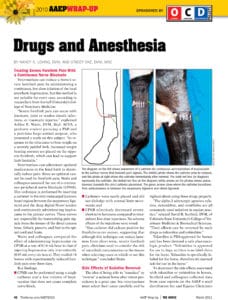Latest News – The Horse
2011 NTRA Safety and Integrity Alliance Standards Approved
The National Thoroughbred Racing Association (NTRA) board of directors has approved the organization’s Safety and Integrity Alliance 2011 Code of Standards. The compliance standards will serve as the basis for future racetrack Alliance accreditation,

Piroplasmosis, Guttural Pouch Infection, Miscellaneous Topics
Additional topics discussed during the 2010 American Association of Equine Practitioners convention included piroplasmosis in horses, guttural pouch infection in foals, detomidine sedative and eye pressure, and eye photography to assist case evaluation and treatment.

Reproduction Advances
Many advances in horse reproduction were discussed during the 2010 American Association of Equine Practitioners convention, including oocyte (egg) harvesting postmortem and in live mares, in vitro fertilization, cloning, genetic testing of biopsied embryos, embryo freezing, epigenetics, stallion/mare fertility and management, stallionlike behavior in mares, twinning, and sex determination.

Rhodococcus equi Pneumonia
Rhodococcus equi is a dangerous pathogen that causes pneumonia in foals that are generally between the ages of 3 weeks and 5 months. In cases caught early on, the foal can make a full recovery with proper treatment. However, in more serious cases the mortality rate is quite high. The disease was discussed in depth during the 2010 American Association of Equine Practitioners convention.

Respiratory Issues in Horses
Horse respiratory issues discussed during the 2010 American Association of Equine Practitioners convention included PCR testing for specific diseases, ceftiofur antibiotic for pneumonia, and electroacupuncture for chronic respiratory disease.


Racehorse Topics
Veterinarians discussed track surface and fatality rates, radiographic (X ray) abnormalities in 2-year-olds, catastrophic injury characteristics in Thoroughbreds vs. Quarter Horses, forelimb and shoulder blade fractures, bone chips in the knee, and angular limb deformity correction at the 2010 American Association of Equine Practitioners convention.

Drugs and Anesthesia
At the 2010 American Association of Equine Practitioners convention, veterinarians discussed continuous pain medication delivery, sedative reversal agents, an oral sedative gel, respiratory support for horses under general anesthesia, anesthetizing donkeys, and anti-inflammatory drug safety.

Compounding
At the 2010 American Association of Equine Practitioners convention, Scott Stanley, PhD, professor of Equine Analytical Chemistry at the University of California, Davis, discussed FDA’s ongoing attempts to ensure safety of drugs produced by compounding pharmacies (that provide individualized medications that are pre-scribed, but unavailable through normal means).

Gastrointestinal Tract
Topic regarding the horse’s gastrointestinal (GI) tract at the 2010 American Association of Equine Practitioners convention included colic surgery closure (sutures vs. staples), resistant ascarids and deworming, heart disease blood tests, colic prognosis indicators, abdominal abscesses, fecal egg counts and individualized deworming, antimicrobial-associated diarrhea, enteropathy, and dehydration.

Lameness: Joints
During the 2010 American Association of Equine Practitioners convention, veterinarians discussed the use of stem cells for arthritis in horses, irap vs. irapII, joint health supplements, TMJ disease, non-surgical pastern joint fusion, stifle abnormalities in cutting horses, and embryonic stem cells for tendon repair.

Lameness: Soft Tissue
Soft tissue lameness topics from the 2010 American Association of Equine Practitioners convention included early mobilization for soft tissue injury, hyaluronic acid-based biomaterial for wounds, back pain, lameness from pigeon fever abscesses, chiropractic care, and enostosislike lesions within long bones.

Equine Welfare
One of the AAEP’s ongoing goals is to address the welfare issues that many horses and their owners face. At the 2010 American Association of Equine Practitioners convention, Midge Leitch, VMD, of Londonderry Equine Clinic in Pennsylvania and immediate past chair of the AAEP Welfare Committee, described three key steps the AAEP has taken—and continues to take—to improve equine welfare in the U.S.

AAEP 2010 Convention Complete Coverage
A wrap-up of the 2010 AAEP Convention, including in-depth coverage of nearly 100 presentations and sessions on all aspects of equine veterinary medicine, from the top studies in 2010 to unwanted horses, lameness, equine welfare, hoof care and more.

Milne Lecture: Eye Surface Failure in Horses
The soft, expressive equine eye holds a great fascination for horse lovers. And although it’s normally a resilient structure, it’s not immune from injury. Dr. Dennis Brooks gave the 2008 AAEP Convention’s Frank J. Milne State-of-the-Art Lecture on catastrophic ocular surface failure (OSF) in the horse.

Keynote: Unwanted Horses
Equine welfare and the growing population of horses needing homes are becoming major challenges veterinarians face on a daily basis, according to the keynote speech “Horse Welfare Wars: When Emotion and Fact Collide” at the 2010 AAEP convention.











